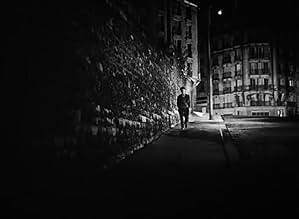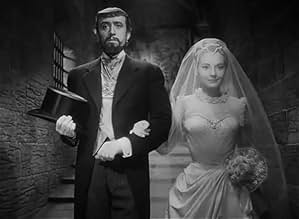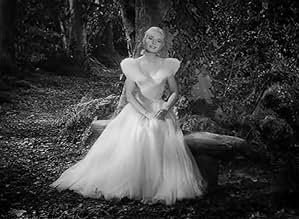Michel ha robado a su patrón, el Sr. Bellanger. Una noche, mientras duerme en su celda, se despierta de repente, las puertas se abren y se encuentra en un extraño pueblo donde todos los habi... Leer todoMichel ha robado a su patrón, el Sr. Bellanger. Una noche, mientras duerme en su celda, se despierta de repente, las puertas se abren y se encuentra en un extraño pueblo donde todos los habitantes han perdido la memoria.Michel ha robado a su patrón, el Sr. Bellanger. Una noche, mientras duerme en su celda, se despierta de repente, las puertas se abren y se encuentra en un extraño pueblo donde todos los habitantes han perdido la memoria.
- Dirección
- Guionistas
- Elenco
- Premios
- 1 premio ganado y 1 nominación en total
- Le châtelain & Monsieur Bellanger
- (as J.R. Caussimon)
- Le marchand de souvenirs
- (as Arthur Devere)
- L'employé
- (as Martial Rebbe)
- Le facteur
- (as Fernand René)
Opiniones destacadas
The film begins in the real world. Michel is in prison. At first, the viewer is uncertain of his crime. What is clear is that he is lonely and heartbroken. One of the other prisoners makes the comment that he could escape in his dreams. This is what Michel does. Most of what follows is one long dream. Michel is searching for his love Juliette. He goes to a village of forgetfulness. Everyone who resides in the village eventually loses his or her memory. Juliette has lost hers as well, but something stirs in her when she sees Michel. Unfortunately, a rich count who resides in an empty castle also has eyes for Juliette. In other words the viewer is given a hero, a quest, a princess, a villain, and a castle, the items of a fairy tale.
Juliette or The Key of Dreams contains some great scenes. One of these is a celebration where fortune tellers offer to read the villagers' pasts. A salesman sells mementos from vacations never taken and memories never made. As the film goes on, the viewer realizes that, by dreaming, Michel is not just trying to escape from prison but also to escape from the entire circumstances that separated Juliette from him. Michel's dream is much brighter than his reality, but, of course, no one can dream forever.
Juliette or the Key of Dreams should be better known. It features an intriguing premise, good actors, and a moving ending. Pleasant, that describes the whole viewing experience.
Michel has robbed his employer for money to court the woman he desires (Juliette). Now in prison, he dreams of an alternate world in an unknown town where he finds Juliette, but also her current suitor, a wealthy man she is about to marry. Devastated, he wakes from the dream, but all is not lost it seems. More a Fairy Tale than a romance, as Michel escapes into dream fantasy to escape reality. For some, fantasy is preferable to real life. Based on a well-known play, directed by Marcel Carné and released in 1951. There is also an operatic version by Bohuslav Martinu.
On the other hand ,all that concerns the "prince " and the hints at Perrault's fairytale "the blue beard" are less successful:Carné probably loved Cocteau's "la Belle et la Bete" (1946) and the poet's influence can be felt in Trauner's film set.And Carné and his playwright borrow from Fritz Lang too:the last forbidden door was already used two years before in "secret beyond the door" .
That makes a big difference with,say,"les enfants du paradis":nothing predated what would become the beloved film of the French cinema.During his heyday,Carne did influence the others ,(for instance ,"les visiteurs du soir"paved a reliable way for Delannoy-Cocteau's "l'eternel retour")in 1950 he was influenced by them.
The movie has a strange structure which recalls another Lang (again!) work,"the woman in the window" (1944):reality (10 min),then a long dream,and return to reality for the last fifteen minutes where we meet again two characters of the dream.One should note that in the dream,the events that lead Michel to jail are told to the audience ,but the connection reality/fantasizing is not very obvious and when it is ,it often verges on childish symbolism.
Should appeal to offbeat works buffs,and of course to Carné's fans.But might bore the others.
¿Sabías que…?
- TriviaThe film was started in October 1941 with Jean Marais and Micheline Presle as "La clé des songes" but because of the war, the production shut down a few weeks later only to be resumed ten years later with a different cast.
- Citas
Juliette: I'm scared
La garde-champêtre: Of what?
Juliette: Oh, not only of him! Of boys... Their manners ares so blunt... And they are so bossy
La garde-champêtre: It's up to you not to obey them.
- ConexionesReferenced in Fukeyo haru kaze (1953)
Selecciones populares
Detalles
- Tiempo de ejecución1 hora 46 minutos
- Color
- Relación de aspecto
- 1.37 : 1
Contribuir a esta página































